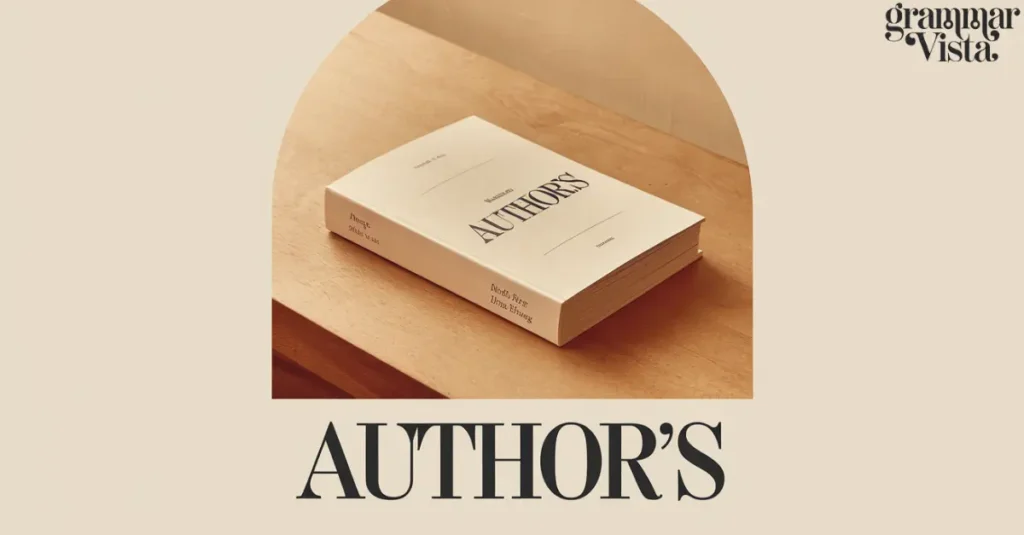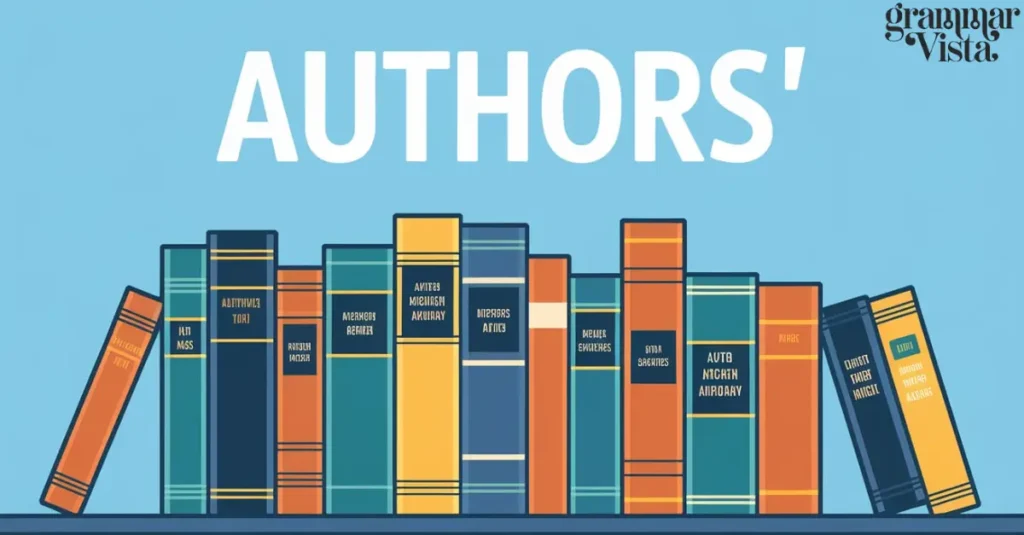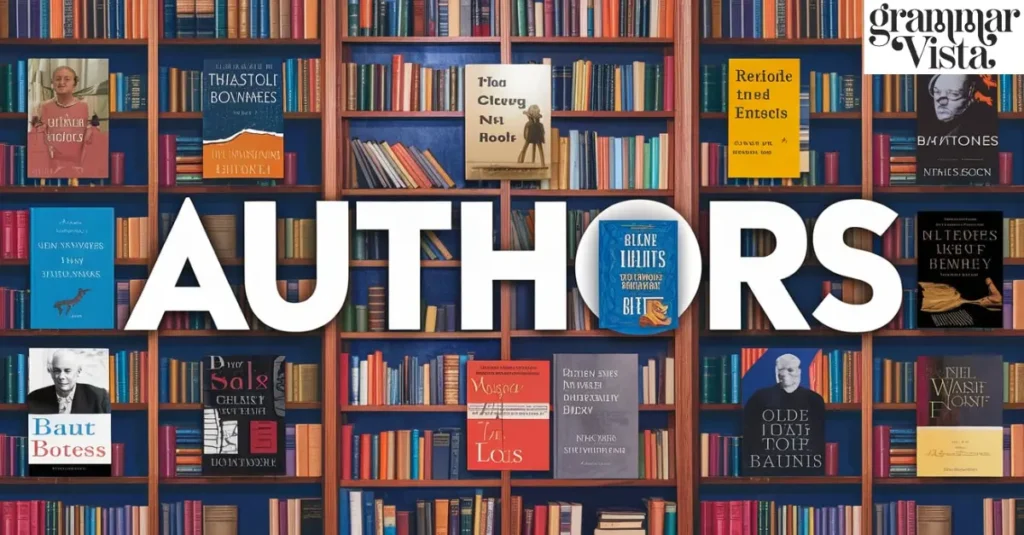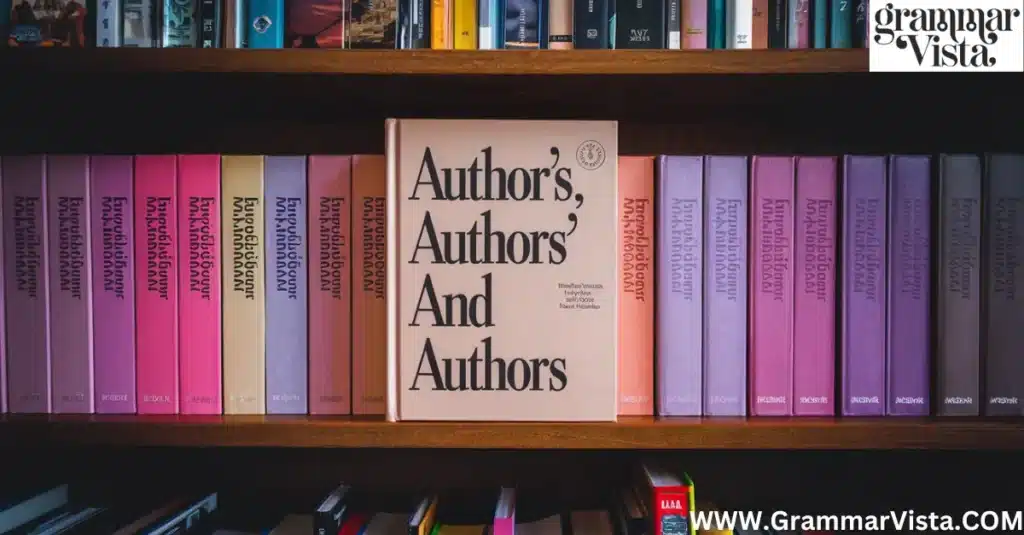Understanding the distinctions between “author’s,” “authors’,” and “authors” is crucial for precise writing. “Author’s” indicates possession by a single author, while “authors‘” shows ownership by multiple authors. In contrast, “authors” simply refers to more than one author without implying possession. Mastering these nuances will enhance your grammar skills. In this guide, we’ll explore each term with clear examples to help you use them correctly in your writing.
Singular Possessive

The singular possessive form shows ownership by a single person. When we’re talking about one author, we use author’s form – simple as that. Think of it as a single writer claiming ownership of their work.
For example:
- The author’s style shines through in every chapter of her latest novel.
- I loved the author’s presentation at yesterday’s conference.
- The author’s name appears in gold lettering on the book’s spine.
Plural Possessive

Things get interesting with plural possessive cases. When several writers share ownership, we use authors’. This form shows that multiple people lay claim to something.
Consider these scenarios:
- The authors’ collaboration resulted in a groundbreaking research paper.
- All the authors’ names appear alphabetically in the bibliography.
- The authors’ group meets every Thursday to workshop their novels.
Just Plain Plural: Authors

Sometimes we simply need the standard plural – authors – when we’re talking about multiple writers without any sense of ownership. This form comes in handy when describing groups of writers in general.
Examples:
- Several authors attended the writing conference.
- Modern authors often maintain active social media presence.
- These authors represent diverse voices in contemporary literature.
Real-World Applications: Making the Right Choice
Let’s explore some practical scenarios to strengthen our linguistic skills:
Single Author Ownership
- Correct: The author’s voice resonated throughout the memoir.
- Why? One author owns their unique voice.
Multiple Authors Sharing
- Correct: The authors’ collective vision shaped the anthology.
- Why? Multiple authors share ownership of the vision.
General Reference
- Correct: Contemporary authors face new challenges in digital publishing.
- Why? We’re talking about authors in general, no possession involved.
Read More about Business’ or Business’s?
Common Mistakes and How to Avoid Them
To achieve clear communication, watch out for these typical errors:
- Mixing up possessive forms:
- Wrong: The authors’s meeting
- Right: The authors’ meeting
- Unnecessary apostrophes:
- Wrong: Multiple author’s attended
- Right: Multiple authors attended
- Singular/plural confusion:
- Wrong: The author’s (when referring to multiple authors)
- Right: The authors’
Professional Context and Writing Techniques
In professional settings, mastering these distinctions elevates your writing expertise. Here’s how different scenarios play out:
Academic Writing
- The author’s methodology (single researcher)
- The authors’ findings (research team)
- Contemporary authors in the field (general reference)
Publishing Industry
- The author’s contract (individual agreement)
- The authors’ rights (collective rights)
- New authors seeking representation (general plural)
Digital Age Considerations

Modern writing techniques have evolved with digital media:
- An author’s blog (individual)
- The authors’ platform (shared blog)
- Aspiring authors online (general reference)
Practical Tips for Perfect Usage
To enhance your language abilities, remember these guidelines:
- Ask yourself:
- Is there ownership involved?
- How many owners are there?
- Are you just referring to multiple people?
- Use this quick test:
- If one person owns = author’s
- If multiple people own = authors’
- If no ownership = authors
Industry-Specific Applications
Different fields require specific writing methods:
Academic Publishing
- The author’s abstract must follow guidelines
- The authors’ contributions section details collaborative work
- Young authors seeking publication
Literary World
- The author’s tone defines their work
- The authors’ collective meets monthly
- Emerging authors showcase their work
Journalism
- The author’s sources remain confidential
- The authors’ investigation revealed corruption
- Freelance authors contribute regularly
Mastering Communication Skills

To achieve effective communication, consider these aspects:
- Context matters:
- Professional documents require precise usage
- Casual writing allows more flexibility
- Academic writing demands consistency
- Style guides help:
- AP Style has specific guidelines
- Chicago Manual details usage rules
- MLA format provides clear direction
Special Cases and Exceptions
Some situations require special attention for proper grammatical forms:
- Compound Possession:
- The author and editor’s collaboration (shared)
- The author’s and editor’s perspectives (separate)
- Historical References:
- The author’s legacy (individual)
- The authors’ movement (group)
Digital Content Creation
Modern composition methods require understanding these distinctions:
- Social Media:
- An author’s profile
- The authors’ network
- Authors supporting authors
- Online Publishing:
- The author’s platform
- The authors’ collective website
- Digital authors worldwide
Practical Applications in Different Writing Contexts
Understanding possessive forms becomes even more crucial when we examine specific writing scenarios. Let’s explore how these rules play out across various contexts.
Digital Publishing and Social Media

In today’s digital landscape, proper usage of author’s form and authors’ form takes on new importance:
Social Media Profiles
- The author’s handle (@writername)
- The authors’ group page
- A community for authors
Blog Management
- The author’s dashboard
- The authors’ collaborative platform
- Featured authors section
You might be interested in Cat’s vs Cats’
Real-World Scenarios and Solutions
Let’s dive into more complex situations that test our linguistic skills:
Scenario: Joint Authorship
- The authors’ shared byline appears at the top
- Their collaborative writers agreement
- The multiple authors contributed equally
Scenario: Corporate Writing
- The author’s department guidelines
- The authors’ style guide
- Internal authors training program
Advanced Grammar Considerations
To further enhance your language abilities, consider these nuanced situations:
Compound Structures
- With individual possession:
- The fiction author’s and poet’s styles differ
- Each writer’s voice is unique
- With shared possession:
- The author and illustrator’s vision
- The writer and editor’s collaboration
Special Cases in Academic Writing
Academic writing expertise demands precise usage:
Citations
- Single author: Smith’s (2023) research
- Multiple authors: Jones et al.’s (2024) findings
- Standard reference: Leading authors in the field
Acknowledgments
- The author’s gratitude
- The authors’ contributions
- Supporting authors and researchers
Industry-Specific Style Guides
Different industries have developed their own writing techniques:
Journalism
- AP Style preferences
- News author’s byline
- The authors’ collective investigation
Technical Writing
- Documentation standards
- The author’s technical notes
- The authors’ specifications
Common Mistakes in Professional Writing
Even experienced writers can stumble with possessive cases:
Avoid These Errors
- Inconsistent usage:
- Wrong: “The authors findings” (missing apostrophe)
- Right: “The authors’ findings”
- Misplaced apostrophes:
- Wrong: “author’s group” (when referring to multiple authors)
- Right: “authors’ group”
- Unnecessary complexity:
- Wrong: “The group of author’s ideas”
- Right: “The authors’ ideas”
Digital Age Writing Considerations
Modern writing methods require adapting traditional rules:
Online Content
- Author’s profile optimization
- Authors’ community guidelines
- Featured authors section
Email Communication
- Author’s signature block
- Authors’ mailing list
- Newsletter for authors
The Impact of Clear Communication
Mastering these distinctions enhances your language proficiency:
Professional Benefits
- Improved credibility
- Better clear communication
- Enhanced writing expertise
Career Advancement
- Stronger documentation skills
- Better editing capabilities
- Superior linguistic skills
Read More grammar lessons on GrammarVista
Future Trends in Writing
The evolution of writing techniques continues:
Emerging Platforms
- AI-assisted writing tools
- Collaborative authoring platforms
- Digital publishing innovations
New Challenges
- Cross-platform consistency
- Global audience considerations
- Multimedia integration
Best Practices for Modern Writers
To maintain high language mastery:
Style Consistency
- Create style guides
- Document preferences
- Review regularly
Quality Control
- Peer review
- Editorial checks
- Consistency audits
The Role of Technology
Modern tools help maintain proper possessive forms:
Writing Software
- Grammar checkers
- Style analyzers
- Collaboration tools
Digital Platforms
- Content management systems
- Publishing platforms
- Editorial workflows
Building Your Expertise
To enhance your writing expertise:
Continuous Learning
- Study style guides
- Practice regularly
- Seek feedback
Professional Development
- Join writing groups
- Attend workshops
- Read industry publications
Remember: The key to mastering these distinctions lies in practice and attention to detail. Whether you’re a seasoned professional or just starting out, understanding the proper use of author’s, authors’, and authors will elevate your writing and strengthen your clear communication.
This comprehensive guide should help you navigate the complexities of possessive forms with confidence and precision. Keep practicing, and soon these distinctions will become second nature in your writing journey.







